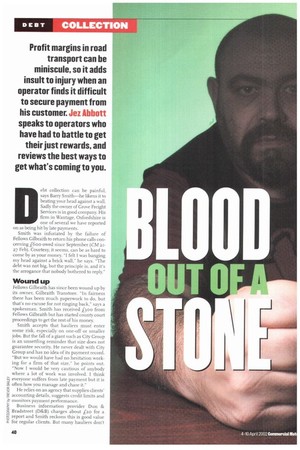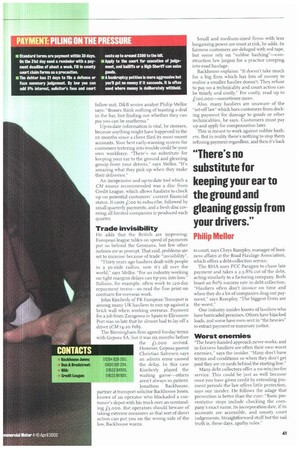ebt collection can be painful, says Barry Smith—he likens it
Page 40

Page 41

If you've noticed an error in this article please click here to report it so we can fix it.
to beating your head against a wall. Sadly the owner of Grove Freight Services is in good company. His firm in Wantage, Oxfordshire is one of several we have reported on as being hit by late payments.
Smith was infuriated by the failure of Fellows Gilbraith to return his phone calls concerning goo owed since September (CM 2127 Feb). Courtesy, it seems, can be as hard to come by as your money. "I felt I was banging my head against a brick wall," he says. "The debt was not big, but the principle is, and its the arrogance that nobody bothered to reply."
Wound up
Fellows Gilbraith has since been wound up by its owner, Gilbraith Transtore. "In fairness there has been much paperwork to do, but that's no excuse for not ringing back," says a spokesman. Smith has received boo from Fellows Gilbraith but has started county court proceedings to get the rest of his money Smith accepts that hauliers must enter some risk, especially on one-off or smaller jobs. But the fall of a giant such as City Group is an unsettling reminder that size does not guarantee security. He never dealt with City Group and has no idea of its payment record. "But we would have had no hesitation working for a firm of that size," he points out. "Now I would be very cautious of anybody where a lot of work was involved. I think everyone suffers from late payment but it is g often how you manage and chase it." S He relies on an agency that supplies clients' accounting details, suggests credit limits and z' monitors payment performance.
.t Business information provider Dun & g Bradstreet (D&B) charges about £20 for a § report and Smith reckons this is good value for regular clients. But many hauliers don't
follow suit. D8.13 senior analyst Philip Mellor says: "Bosses think nothing of toasting a deal in the bar, but finding out whether they can pay you can be anathema."
Up-to-date information is vital, he stresses, because anything might have happened in the to months since a client filed its most recent accounts. Your best early-warning system fur customers teetering into trouble could be your own workforce. "There's no substitute for keeping your ear to the ground and gleaning gossip from your drivers," says Mellor. "It's amazing what they pick up when they make their deliveries."
An inexpensive and up-to-date tool which a CM source recommended was a disc from Credit League, which allows hauliers to check up on potential customers' current financial status. It costs froo to subscribe, followed by small quarterly payments, and a fresh disc covering all limited companies is produced each quarter.
Trade invisibility
He adds that the British are improving: European league tables on speed of payments put us behind the Germans, but few other nations are as prompt. That said, problems are set to increase because of trade "invisibility".
"Thirty years ago hauliers dealt with people in a 30-mile radius, now it's all over the world," says Mellor. "For an industry working on tight margins delays can tip you into loss." Italians, for example, often work to 120-day repayment terms—so read the fine print on contracts for overseas work.
John Kimberly of PK European Transport is among many UK hauliers to run up against a brick wall when working overseas. Payment for a job from Zaragossa in Spain to Ellesmere Port was so late that he almost had to lay off a driver (CM14-20 Feb).
The Birmingham firm agreed 6o-day terms with Geposa SA, but it was six months before the fr,000 arrived. However, Ceposa parent Christian Salvesen says an admin error caused the delay. ln this case Kimberly played the waiting game—others aren't always so patient. Jonathon Backhouse, partner at transport solicitor Backhouse Jones, knows of an operator who blockaded a customer's depot with his truck over an outstanding £5,000. But operators should beware of taking extreme measures as that sort of direct action can put you on the wrong side of the law, Backhouse warns.
01254 828 300.
0800 001 234.
01932 841515.
01623 861551.
Small and medium-sized firms with less bargaining power are most at risk, he adds. In fairness customers are deluged with red tape, but some rely on "subbie bashing"—construction law jargon for a practice creeping into road haulage.
Backhouse explains: "It doesn't take much for a big firm which has lots of money to realise a smaller haulier doesn't. They refuse to pay on a technicality and court action can be timely and costly." For costly, read up to floo,000—sometimes more.
Also, many hauliers are unaware of the "set-off law" which bars customers from docking payment for damage to goods or other technicalities, he says. Customers must pay up and apply for compensation later.
This is meant to work against subbie bashers. But in reality there's nothing to stop them refusing payment regardless, and then it's back to court, says Chrys Rampley, manager of business affairs at the Road Haulage Association, which offers a debt-collection service.
The RHA uses FCC Paragon to chase late payment and takes a 2.5-8% cut of the debt, acting similarly to a factoring company. Both boast an 8o% success rate in debt collection. "Hauliers often don't invoice on time and when they do a lot of companies drag out payment," says Rampley. "The biggest firms are the worst."
One industry insider knows of hauliers who have barricaded premises. Others have hijacked loads, and some have even sent in "the heavies" to extract payment or summary justice.
Worst enemies
"The heavy-handed approach never works, and in fairness hauliers are often their own worst enemies," says the insider. "Many don't have terms and conditions so when they don't get paid they are TO yards behind the starting line."
Many debt collectors offer a no-win/no-fee service. This could be just as well because once you have given credit by extending payment periods the law offers little protection, says our insider. He follows the adage that prevention is better than the cure: "Basic preventative steps include checking the company's exact name, its incorporation date, if its accounts are accessible, and county court judgements. Straightforward stuff but the sad truth is, these days, apathy rules."
















































































































































